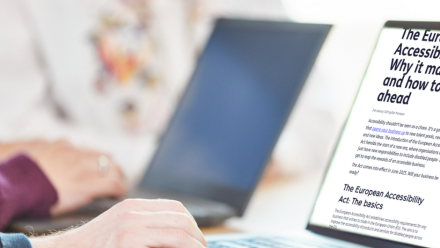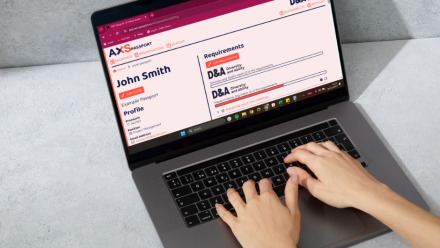How can I get from education to employment as a disabled graduate?
8th September 2021 by Ellie Thompson
For disabled graduates, one question that is always on our lips is: how do I find employment that sustainable and accessible to me, and enables me to reach my full potential? There are multiple, complex, ever-changing barriers to us being able to answer this question. Especially in a year where we are witnessing new forms of disablement, lasting isolation, and global unemployment.
The disability employment gap currently stands at 28.1%: 53.6% of disabled people are employed, compared to 81.7% of non-disabled people. In the latest episode of our ‘Disabled in HE’ video series, we brought together people with lived experience and expertise in removing the barriers disabled people experience when transitioning from education to employment. Here’s what we can do to make that transition equitable, inclusive and accessible.
1. Transform conversations about ‘disclosure’
Disabled entrepreneur and Founder and CEO of Evenbreak Jane Hatton, who joined our discussion, questioned the very use of the word ‘disclosure’: “it sounds a bit like it’s a dirty secret- and it isn’t.” Instead of seeing our disability as a deficit or burden for an organisation, we should be recognising the strength and value we are bringing. Jane says, “disabled candidates are premium candidates”. We know that diversity is strength and brings with it innumerable business benefits; from new innovative ideas, to a great reputation, to enhanced profits.
Adam Hyland, our Co-founding Director of Accessibility and Inclusion at Diversity and Ability, instead invites us to talk about “sharing your diversity”, a language shift that acknowledges the reality- that we’re bringing something great to an organisation!
2. But recognise that it’s not always safe to share
Although every employer should recognise the value in openly welcoming and celebrating diversity, we’re not there yet. As disabled people who so wholeheartedly fight for disability justice, it’s easy to feel a responsibility to shout from the rooftops about your disability and access needs (as we have every right to do!). But in reality, that may not be a safe or comfortable option all the time. We have no responsibility to share anything about ourselves that we don’t want to; and the burden is not on you as an individual to transform an organisation’s understanding of disability but on the organisation to do better. We know that self-advocacy can be incredibly mentally and emotionally draining, so really think about what will work best for you. And, of course, put your employers in contact with organisations like us who will open their eyes to the true value of celebrating diversity.
If you’re applying to an organisation that is openly celebratory of diversity and transparent about their inclusive practices, you can know that they’ll be welcoming of conversations about disability and diversity. But, as Jane says, “if it’s an organisation that you’re not too sure of, then it might be better for them to see you and learn about your skills first before you feel comfortable talking about adjustments”.
Although there are benefits to sharing your diversity with your employer, we’re still on our way to true disability justice; so, start from a place of thinking about what will be the best, safest and most accessible option for you.
3. Give yourself a head start by applying for Access to Work as soon as possible
Piers points out that Access to Work is often labelled “the Department of Work and Pensions’ best-kept secret”. Access to Work is a grant support from the government that supports organisations in breaking down the barriers you may face in accessing your work. It’s a process that can feel a little overwhelming at first, which is why we’ve broken down every step in our Access to Work- Find Your Way guide.
Although Access to Work as a scheme provides transformative support for employees, it should really be seen as a support for employers- it helps them meet their legal responsibility to provide reasonable adjustments for their workers, and through enabling people helps them achieve massive business successes. But Adam says: “unfortunately there’s a good chance [employers aren’t] going to know anything about it. But I do think employers will want to know about it and want to support you in applying. So, although it shouldn’t be on us as a community to learn about it in detail, if we can research more about it and have an understanding of how it can support us in the workplace, it’ll help employers feel more confident about supporting us.”
What’s one piece of advice that Adam, Jane and Piers would give?
As with every video in our Disabled in HE series, we finish with a practical action that you, as a reader, viewer or listener, can do to help break down these barriers. So, what advice would Jane, Adam and Piers give?


